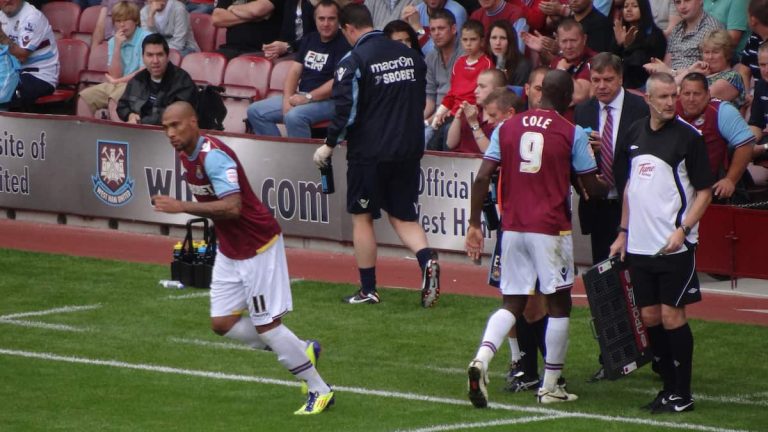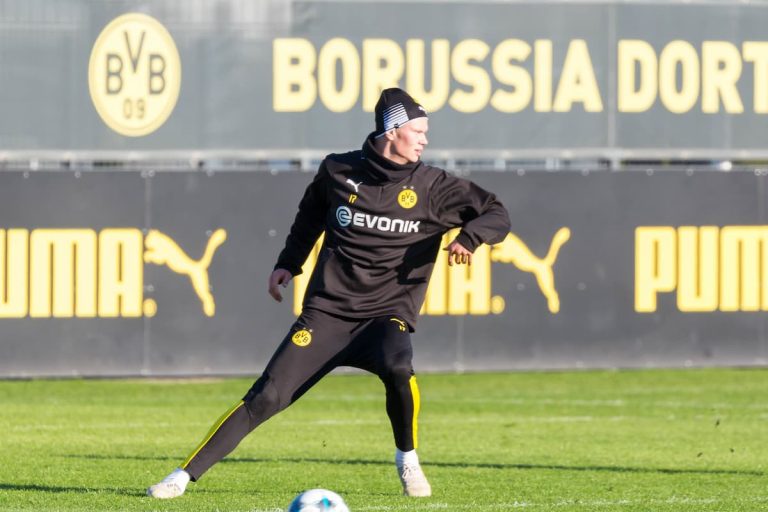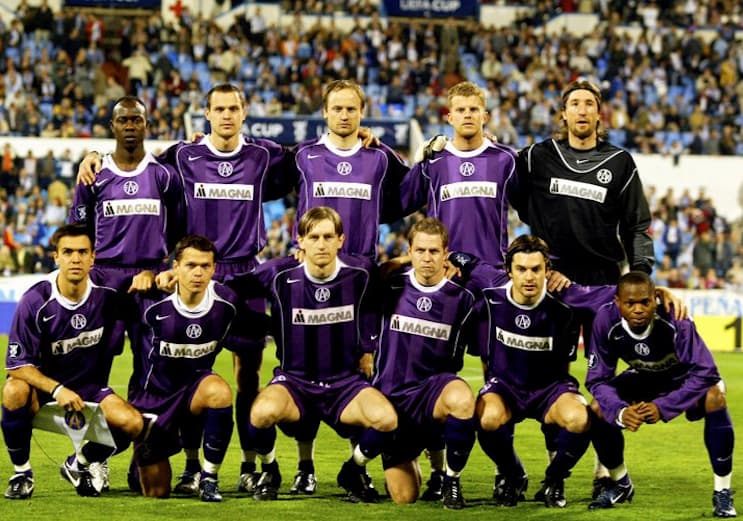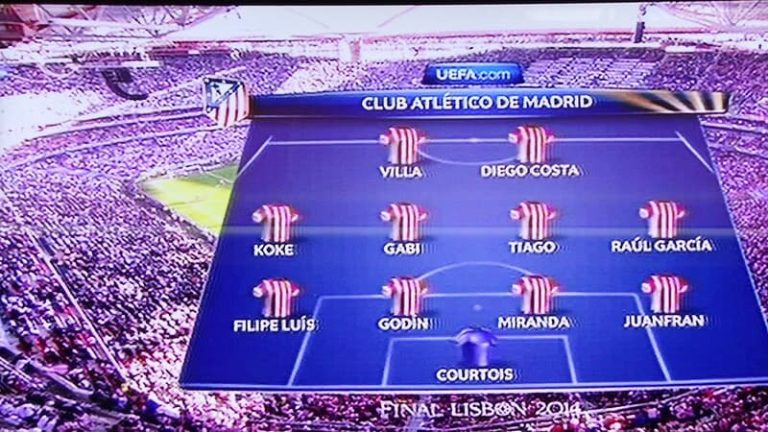What Does “Off the Post” Mean in Football?

In football, commentators and pundits will often say the phrase “off the post”, if you’ve ever heard this said, and are unsure what it means, this article is for you. We discuss the meaning of the phrase, why it’s important, techniques for avoiding the post and more.
Learn all about this common phrase in football by reading on.
Table of Contents
What Does “Off the Post” Mean in Football?
The phrase “off the post” is used to indicate that the football has made contact with either goalpost, with the direction of the ball changing. This is not to be confused with the phrase “off the crossbar” which is when the ball makes contact with the horizontal post of the goal.
How It Relates to the Goalpost
In football, there are two goal frames on a pitch, one in a team’s first third (the one they defend) and the other in the final third (the one they attack). A goal frame is made up of three different posts:
- Two posts (vertically standing)
- One crossbar (horizontally placed)
The two vertical posts support the crossbar to create a rectangle goal where footballers try to kick the ball into. When somebody says the phrase “off the post” in football, they’re referring to when the ball hits one of the two vertical goalposts and not the single horizontal post.
Examples of “Off the Post” Scenarios in Football
There have been many examples of football players taking shots that are denied by the post or crossbar. Here’s a compilation video of some of the most iconic examples of this from the Premier League.
These clips include efforts taken by Luis Suárez, Cristiano Ronaldo and many more Premier League stars:
Why Is “Off the Post” Important in Football?
Shots that come “off the post” are important in football for a number of reasons, including their impact on the outcome of the game, effect on team morale and momentum, and how it affects goalkeepers.
Impact on the Outcome of the Game
Shots that come “off the post” in football can impact the outcome of a game. If a team is unlucky and a shot comes off the post and doesn’t go in, this means that they won’t have scored a goal. If they are, instead, lucky and their shot goes in off the post, they’ll have scored a goal and will subsequently have a higher chance of winning the game.
Effect on Team Morale and Momentum
Shots that hit the post can have a huge effect on team morale and momentum. This is because there’s a fine line between being unlucky and lucky when this happens. This has a psychological effect on the players, manager, and fans.
For example, if a player hits the post and their shot doesn’t go in, they’ll feel incredibly unlucky, thinking they deserved to score a goal at that moment. This can affect their mentality negatively for the remainder of the match. This feeling can also be felt by the player’s fellow teammates as well as the fans in the stadium.
If that team loses the match, the shot that came off the post will most likely be one of the biggest talking points of the game. On the other hand, if a team scores a goal in off the post, they’ll feel like luck is on their side and that will give the team, manager and fans a positive outlook for the rest of the match. This shifts the momentum their way, giving them more confidence than the opposition.
It’s such a small margin between scoring a goal or missing a chance off the post, but either way it can have a huge effect on team morale, confidence and momentum.
How It Affects Goalkeepers
A shot off the post can also have a huge impact on the goalkeeper in that goal. If the goalkeeper sees the ball hit the post, they’ll become more aware of the potential danger and will try to be more focused for the remainder of the game.
Goalkeepers care about keeping clean sheets in football, and shots that go in off the post will eliminate their clean sheet. People would describe this scenario as a “wake-up call” for both goalkeepers and defenders of the defending side.
What Are Goalposts Made Out Of?
In England, the Football Association recommends that “wooden goals should be replaced when necessary with compliant metal, aluminium or plastic goalposts.” The reason for this is that wooden goalposts that have been tested have failed both strength and stability tests.
The material that goalposts are made out of has to be considered for health and safety purposes too. There have been many occasions when goalkeepers and players have collided with the posts or crossbar with their head, and this can be dangerous for the players involved.
Were Goalposts Ever Made Out of Wood?
Yes, goalposts were made out of wood from the 1860s all the way through to the 1970s. These were made from Douglas Fir wood. By the 1980s, wooden goalposts were replaced with steel goalposts due to their durability.
Techniques for Avoiding Hitting the Post
If football teams find themselves hitting the post often, it’s worthwhile looking into techniques for trying to avoid hitting the post. These techniques involve improving accuracy and precision, proper shot placement and adjusting to the angle of the goalpost.
Improving Accuracy and Precision in Shooting
The first thing managers can do is prioritise improving the accuracy and precision of shooting within their team. The more shooting practice players get in training, the less likely they’ll be to hit the post and miss during matches.
Proper Shot Placement
Something else managers can do is to focus their efforts on proper shot placement during matches. Being able to place the ball as close to the post as possible without hitting it gives a player the best chance of scoring a goal, as it’ll be hard for the goalkeeper to reach the ball with their hands.
Adjusting to the Angle of the Goalpost
Adjusting to the angle of the goalpost is another useful strategy to explore if a team or player is regularly hitting the goalpost. Footballers take shots from many different angles during football matches, and attacking players need to have the awareness of how the angle of the post might affect their efforts on goal.
If a player is taking a shot from a tight angle, they should prioritise aiming towards the far post rather than the near post. This is because if the ball hits the post, it’s more likely to go in the goal if it hits the far post, due to the laws of physics.
Conclusion
The term “off the post” is commonly used in football by commentators and pundits and refers to when attacking players take a shot and the football makes contact with either of the two vertical posts.
This scenario has a number of effects on the player who takes the shot, their teammates, the manager and the fans due to the fine line of feeling lucky or unlucky. There are strategies that managers can use to try to best avoid their players hitting the post, but inevitably there are extremely fine margins between scoring a goal or missing a chance off the post that can’t be avoided.
We hope that you learned something new today during this Elastico article!
Frequently Asked Questions
What Does “In Off the Post” Mean in Football?
The phrase “in off the post” refers to when a shot goes into the goal after making contact with one of the vertical posts.
What Is Meant by “Off the Woodwork” in Football?
The phrase “off the woodwork” refers to when a shot is taken and the football makes contact with any part of the goal frame. This means it hits either one of the vertical posts or the horizontal crossbar.
What Does “Off the Crossbar” Mean in Football?
The phrase “off the crossbar” refers to when a shot is taken and the football makes contact with any part of the horizontal post of the goal frame.
Why Are Football Posts Called Woodwork?
The term “woodwork” refers to the frame of a goal in football. It originated from when football goals were made out of wood. Football goals were made out of wood before the 1970s, and the term has stuck within footballing circles to the present day.






